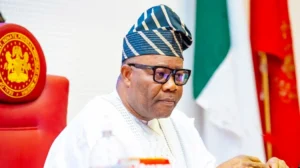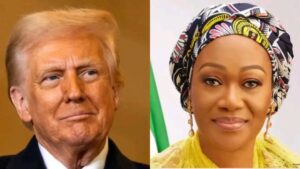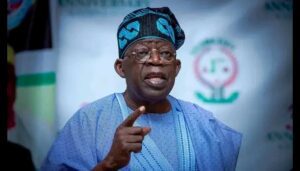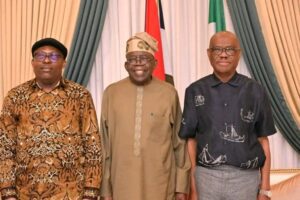Legal tussle between APC, PDP intensify as court admits EU’s report as evidence
Despite objections by President Bola Tinubu and the All-Progressives Congress (APC), the Presidential Election Petition Court (PEPC), sitting in Abuja, on Monday, admitted in evidence, the final report of the European Union (EU), Observation Mission, which impugned the outcome of the 2023 general elections.
The report was tendered before the court by candidate of the People’s Democratic Party (PDP), Alhaji Atiku Abubakar, who alleged that the presidential election that held on February 25, was manipulated to favour President Tinubu and the ruling APC.
In a joint petition he filed alongside his party, Atiku, alleged that the Independent National Electoral Commission (INEC), installed a third-party device that intercepted and allocated votes to Tinubu.
Even though INEC had in its reply to the petition, denied the allegation, however, at the resumed proceedings of the court on Monday, the Deputy Director of ICT at the Commission, Mr. Lawrence Bayode, mounted the witness box to defend the outcome of the presidential poll.
Bayode, in a bid to puncture Atiku’s claim that Tinubu’s running mate was nominated for two elective positions, produced four documentary exhibits, among which included a letter dated July 6, 2022, which the Vice President, Kashim Shettima, wrote to INEC to notify it of his decision to withdraw as candidate of the APC for the Borno Central Senatorial election.
Led in evidence by INEC’s lead counsel, Mr. Abubakar Mahmoud, SAN, the witness, tendered the letter and its accompanying certification, which was admitted in evidence and marked as Exhibits RA-1 and RA-2.
While being cross-examined by President Tinubu’s lead counsel, Chief Wole Olanipekun (SAN), the witness, maintained that the presidential election was “free, fair, credible and conducted in substantial compliance with the Electoral Act.”
“Recordings on INEC’s Form EC8A (polling unit results) forms basis for any election result and data or internet is required for Form EC8A captured by the BVAS machines to be uploaded,” the witness added.
He told the court that images captured by the BVAS, whether transmitted manually or electronically, would not affect the integrity of an election.
“In practical terms, election is completed at the polling unit level when the officer conducts, announces results and record the result on the Form EC8A,” Bayode told the court. Also answering questions from APC’s lawyer, Prince Lateef Fagbemi, SAN, the witness admitted that though the electoral body experienced a technical glitch on the day the presidential poll held, he, however, insisted that it did not affect the actual scores of all the presidential candidates, which he said remained intact.
He further told the court that results of the presidential election was not electronically collated, saying it was done manually.
“INEC does not have an electronic collation system,” he stated, adding that Chairman of the Commission, Prof. Mahmoud Yakubu had two days before the presidential poll was held, announced that electronic transmission of results of the election would not be feasible.
Fagbemi (SAN) tendered a copy of Tribune Newspaper of February 23, 2023, where the INEC Chairman was reported to have waved aside the possibility of real-time transmission of results of the presidential election.
Though Atiku’s lawyer, Uche, SAN, opposed the admissibility of the page containing the said news item from the INEC boss, he urged the court to admit the front page of the newspaper with a banner headline that read: “Atiku, a man whose time has come.”
The certified copy of the Newspaper was subsequently admitted in evidence and marked as Exhibit RA-5.
When it was his turn to cross-examine the witness, Atiku’s lawyer, Uche, SAN, asked him to confirm before the court, if the EU Observation Mission was accredited by INEC to monitor the 2023 general elections.
After the witness told the court that the EU team was duly accredited to monitor the elections, he was asked if he was aware that EU released its final report on the 2023 general elections.
The INEC’s witness told the court that though he was aware of that EU recently released a report on the elections, he said he had not seen it.
When he was shown a certified copy of the report and asked to read from a portion of it, both President and the APC, through their respective lawyers, raised objections.
However, notwithstanding the objections, the panel admitted the report in evidence and marked it as Exhibit RA-6.
Following a request by counsel to the Petitioners, the witness, read in the open court, a paragraph in the report, where EU stated that the 2023 election was not “a transparent and inclusive election” as promised by the INEC.
He also read a portion in the report that stated that “only 31% of results uploaded in I-REV was formally or mathematically correct.”
The witness, however, maintained that technological innovations that INEC introduced into the electoral process was to guarantee transparency and integrity of the results.
He admitted that both the National Assembly and the Presidential election were conducted on the same day and with the same BVAS machines.
The witness told the court that it was wrong for the Petitioners to claim that because of system failure, all the results of the presidential election were not electronically transmitted.
“Some of the results were uploaded on the IReV portal on the day of the presidential election, but not all of them.”
“As of March 1, when a winner was declared, not all of the results were uploaded to the IReV portal,” the witness added.
Asked if INEC filed any formal complaint to Amazon Web Services, AWS, over glitches experienced during the presidential election, the witness, said: “We did not need to file a report to Amazon over the technical glitch and we did not need to do that.
“I supervised the configuration of the system that was used for the election.”
Asked if the system INEC deployed for the presidential election, had in-built mechanism for distinguishing between the Presidential and NASS election, the witness answered in the negative.
“There is no human interference. The system is configured in a way that you click a button to upload result of particular election,” he told the court.
Shortly after the witness was discharged from the box, INEC’s lawyer, Mahmoud, SAN, told the court that his client would not call any other witness in the matter.
Consequently, counsel to President Tinubu and Vice-President Shettima, Chief Olanipekun, SAN, announced that his clients would open their own defence on Tuesday.
It will be recalled that Atiku, who came second in the presidential contest, closed his case after he called a total of 27 out of 100 witnesses he scheduled to testify in the matter.
He is among other things, praying the court to withdraw the Certificate of Return that was issued to President Tinubu by INEC.
Atiku and his party contended that President Tinubu “demonstrated inconsistency as to his actual date of birth, secondary schools he attended (Government College Ibadan); his State of origin, gender, actual name; certificates evidencing Universities attended (Chicago State University).”
According to the petitioners, “The 2nd Respondent did not disclose to the 1st Respondent (INEC) his voluntary acquisition of the citizenship of Republic of Guinea with Guinean Passport No. D00001551, in addition to his Nigerian citizenship. The 2nd Respondent is hereby given notice to produce the original copies of his said two passports,” they added.
The petitioners equally challenged Tinubu’s eligibility to contest the presidential election, alleging that he was previously indicted and fined the sum of $460,000.00 by the United States District Court, Northern District of Illinois, Eastern Division, in Case No: 93C 4483, for an offence involving dishonesty and drug trafficking.
All the Respondents had in their replies, urged the court to dismiss the petition which they maintained was bereft of merit.





